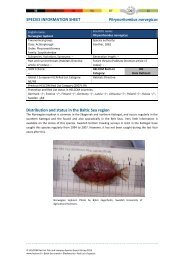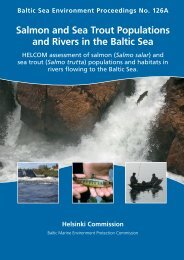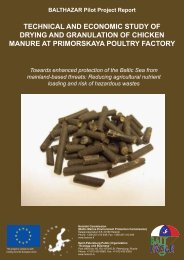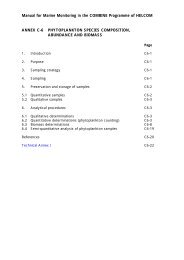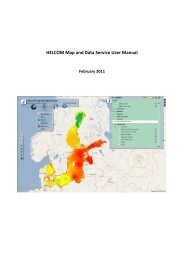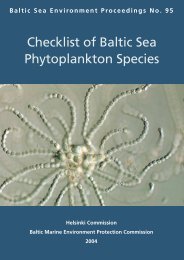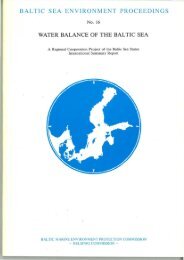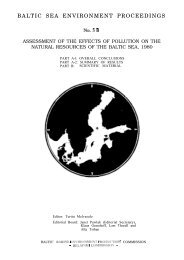- Page 1 and 2:
BALTIC SEAENVIRONMENT PROCEEDINGS N
- Page 3 and 4:
Preface General statements and lect
- Page 5:
Practical organization of national
- Page 8 and 9:
HELCOM SEMINAR for Experts from Est
- Page 10 and 11:
obligations. When fulfilling HELCOM
- Page 12 and 13:
Fleming Otzen Chairman of the Helsi
- Page 14 and 15:
facts and thus avoiding the long la
- Page 16 and 17:
In earlier days it was unthinkable
- Page 18 and 19:
possibilities. HELCOM decision in 1
- Page 20 and 21:
Catchment area solved by HELCOM but
- Page 22 and 23:
denominator, however, in that an af
- Page 24 and 25:
the general public, openness within
- Page 26 and 27:
The Baltic Sea Joint Comprehensive
- Page 28 and 29:
Submitted by Russia HELCOM SEMINAR
- Page 30 and 31:
During the last year the ecological
- Page 32 and 33:
ENVIRONMENTAL PROTECTION DEPARTMENT
- Page 34 and 35:
The financing of capital investment
- Page 36 and 37:
The first phase of the main study i
- Page 38 and 39:
At Liepaja in some kind we have an
- Page 40 and 41:
- organizing of Environmental Enfor
- Page 42 and 43:
44. Daugava River Basin/RER Plant -
- Page 44 and 45:
HELCOM SEMINAR FOR EXPERTS FROM EST
- Page 46 and 47:
Some of the special topics have bee
- Page 48 and 49:
The Duties of EGAP HELCOM SEMINAR R
- Page 50 and 51:
average concentrations of nitrogen
- Page 52 and 53:
The second purpose of emission data
- Page 54 and 55:
Model results for the total deposit
- Page 56 and 57:
Table 1. Measurement DroPramme of E
- Page 58 and 59:
1. 2. 3, 4. 5. 6. 7. 8. 9. 10. 11.
- Page 60 and 61:
Table 6. Deposition estimates for t
- Page 62 and 63:
Figure 2. Annual average nitrogen c
- Page 64 and 65:
Figure 4. Average wet fluxes of nit
- Page 66 and 67:
INTRODUCTION The Baltic Sea is the
- Page 68 and 69:
out of Chernobyl in the Baltic Sea
- Page 70 and 71:
ed by the initial fallout. Figure 2
- Page 72 and 73:
Fig. 1 r- u) LD Lo u-l u-l 68
- Page 74 and 75:
Bs 1.oc!E+141 1.ooE+13 WOE+12 l.OOE
- Page 76 and 77:
INTRODUCTION Article 16 of the Hels
- Page 78 and 79:
Qualitv Assurance (OA) The success
- Page 80 and 81:
had been a ten-fold reduction of co
- Page 82 and 83:
Improvements of Guidelines The Guid
- Page 84 and 85:
life. This objective, which can be
- Page 86 and 87:
6 4 6 2 6oc MAP OF THE MONITORING S
- Page 88 and 89:
Table 2. Obligatory and tentative d
- Page 90 and 91:
Table 5. SAMPLING FREQUENCY OF BMP.
- Page 92 and 93:
The Need for Quality Assurance in M
- Page 94 and 95:
(Topping, 1992). Two principal comp
- Page 96 and 97:
increasing frequency, analysts find
- Page 98 and 99:
PHASE 1 OF THE VALIDATION PROCESS E
- Page 100 and 101: m- Information Service 22.6.1993 BA
- Page 102 and 103: Appendix Baltic Marine Environment
- Page 104 and 105: Baltic Marine Environment Bibliogra
- Page 106 and 107: 1. MC tasks in general The Tasks an
- Page 108 and 109: of MC decisions, informal meetings
- Page 110 and 111: 4. Conclusions Taking all in all th
- Page 112 and 113: ~esedealwithsu&mattersas applicatio
- Page 114 and 115: ~l~~ofa009K>SStQntandabove~be~~with
- Page 116 and 117: mv l(T,zzbaae) Ehtxy into foxre: 31
- Page 118 and 119: For existing crude oil tankers, a t
- Page 120 and 121: me first set of amrkmmts to MARWL 7
- Page 122 and 123: Theseamendmntsweredesigmdtoencourag
- Page 124 and 125: The 1990 alredmnts Adoption: March
- Page 126 and 127: Regulation 13G also allows for futu
- Page 128 and 129: Many of these ships are now 15 to 2
- Page 130 and 131: Jukka Hakamies Secretary of Interna
- Page 132 and 133: the condition of ships more closely
- Page 134 and 135: detention percentage, which is supp
- Page 136 and 137: Regulation 19 Ir] Control * Figure
- Page 138 and 139: 6 5 4 3 2 1 0 L percentage 7 source
- Page 140 and 141: Flag States with detention percenta
- Page 142 and 143: COMMON POLICY ON DETENTION PROCEDUR
- Page 144 and 145: 35 30 25 20 15 10 5 0 Targe, t Actu
- Page 146 and 147: 1. Introduction On the 32th session
- Page 148 and 149: CHAPTER 2 Figure 1.1 f I-- - -_ CHA
- Page 152 and 153: The first task of this agency would
- Page 154 and 155: 4. Lesal aspects Firstly a few rema
- Page 156 and 157: facility as it is a primary means o
- Page 158 and 159: developed and it should address als
- Page 160 and 161: facilities. In many cases it is pos
- Page 162 and 163: installation for Annex V serves as
- Page 164 and 165: a free of charge system. Applicatio
- Page 166 and 167: does not exist. When cargo residues
- Page 168 and 169: to the trip to be undertaken, shoul
- Page 170 and 171: HELCOM SEMINAR For Experts from Est
- Page 172 and 173: RECEPTION FACILITIES IN PORTS Artic
- Page 174 and 175: The capacity of each reception faci
- Page 176 and 177: COOPERATION IN THE PREVENTION OF PO
- Page 178 and 179: Tanker Tractor Unit IAF = Induced A
- Page 180 and 181: HELCOM SEMINAR for Experts from Est
- Page 182 and 183: At the beginning under the Technolo
- Page 184 and 185: The Commission has decided that the
- Page 186 and 187: Bernd Mehlhorn Chairman TC POINT TC
- Page 188 and 189: Priorities The working strategy for
- Page 190 and 191: - nutrient balance, including ferti
- Page 192 and 193: EXISTING REPORTS CONCERNING POLLUTI
- Page 194 and 195: CLASSlFICATIONOFTHEINPUTSTOTHEBALTI
- Page 196 and 197: Table 5.1 Organic matter (BOD,) Loa
- Page 198 and 199: Table 5.3 Sub-region Rivers Total N
- Page 200 and 201:
-NOTALLREQUESTEDBASICINFORMATION SU
- Page 202 and 203:
CONCERNING THE REDUCTION OF 50% OF
- Page 204 and 205:
DIVISION OF TASKS AND RESPONSIE3ILI
- Page 206 and 207:
wastewater disposal plants are met
- Page 208 and 209:
It is particularly important to rec
- Page 210 and 211:
without any great difficulty. Only
- Page 212 and 213:
agriculture. Later HELCOM recommend
- Page 214 and 215:
Within the last decade in Denmark f
- Page 216 and 217:
Agency calculated the effect of the
- Page 218 and 219:
Public random control on pesticides
- Page 220 and 221:
Forest and Nature Conservation, the
- Page 222 and 223:
ecommendation is thus of great impo
- Page 224 and 225:
The ‘Recommendation concerning re
- Page 226 and 227:
chance to give their opinion and pr
- Page 228 and 229:
- norms may cause technical stagnat
- Page 230 and 231:
ECONOMIC INSTRUMENTS IN ENVIRONMENT
- Page 232 and 233:
- How well does the approach implem
- Page 234 and 235:
environmental sectors. The Committe
- Page 236 and 237:
ENVIRONMENTAL PROTECTION RELATED TA
- Page 238 and 239:
235 ANNEX 3 zs-. 8. J943 &da&_
- Page 240 and 241:
2. ITEMS AND OBJECTIVES FOR NEGOTIA
- Page 242 and 243:
In case permit conditions include a
- Page 244 and 245:
If permit conditions are violated,
- Page 246 and 247:
ANNEX5 Tasks and personnel in the i
- Page 248 and 249:
until 80-100%. All local costs will
- Page 250 and 251:
HELCOM SEMINAR FOR EXPERTS FROM EST
- Page 252 and 253:
management section of the Ministry.
- Page 254 and 255:
No. 187 DECREE ON THE ADVISORY BOAR
- Page 256 and 257:
253
- Page 258 and 259:
Annual cycle of national preparatio
- Page 260 and 261:
A number of important environmental
- Page 262 and 263:
The main tasks are: -accumulating f
- Page 264 and 265:
STATENS NATURVhWWERK Swedish Enviro
- Page 266 and 267:
ORGANIZATION OF THE NATIONAL SWEDIS
- Page 268 and 269:
HELCOM SEMINAR for Experts from Est
- Page 270 and 271:
2 2.1 2.2 2.3 2.4 2.5 2.6 2.7 3 3.1
- Page 272 and 273:
Initial Contributions Annual Contri
- Page 274 and 275:
THE INTERNATIONAL CONVENTIONS ON LI
- Page 276 and 277:
THE INTERNATIONAL CONVENTIONS ON LI
- Page 278 and 279:
Only a spill from a tanker which is
- Page 280 and 281:
3.2 Limit of compensation The maxim
- Page 282 and 283:
After the Assembly’s decisions on
- Page 284 and 285:
(9 (9) 0-O 0) 5 5.1 Pre-spill preve
- Page 286 and 287:
Before the entry into force of the
- Page 288 and 289:
The Fund Convention has so far been
- Page 290 and 291:
Pollution Reoorting Oil Polbtion Em
- Page 292 and 293:
. Technical services - Facilitate C
- Page 294 and 295:
Captain Thomas Fag8 RIGA September
- Page 296 and 297:
Otherwise, it is very difficult to
- Page 298 and 299:
are nations. 4. Organisation of the
- Page 300 and 301:
Conclusions With this brief overvie
- Page 302 and 303:
Country Central government departme
- Page 304 and 305:
GOVERN- MENT LEVEL CENTRAL AUTHORIT
- Page 306 and 307:
FIGURE 302-l Appendix 6 TANKER SPIL
- Page 308 and 309:
Xunhl Direccibn General de Protecci
- Page 310 and 311:
OPERATIONAL FUNCTION Appendix 10 *
- Page 312 and 313:
LOGISTICS *Procurement *Transporbli
- Page 314 and 315:
Recommendation 6/13 Recommendation
- Page 316 and 317:
The system is for use between comba
- Page 318 and 319:
COMMAND STRUCTURE FOR JOINT COMBATT
- Page 320 and 321:
Chapt.er 12 CO-OPERATION ON AERIAL
- Page 322 and 323:
PART II (POLINF) 40. 41. 42. 43. 44
- Page 324 and 325:
CHAPTER 5.6 page 2 47 Drift of alga
- Page 326 and 327:
1. Introduction Informal Working Gr
- Page 328 and 329:
As decided upon by CC To be propose
- Page 330 and 331:
2.4. 2.4.1. 2.4.2. 2.4.3. 2.4.4. 2.
- Page 332 and 333:
s/8 *I9 5.2 Some Delegations expres
- Page 334 and 335:
Paragraph 6.5 to accept the aims an
- Page 336 and 337:
CHAPTER 10 page Z/2 a fundamental p
- Page 338 and 339:
Furthermore, it is the intention an
- Page 340 and 341:
sea furface, and persistent oils, w
- Page 342 and 343:
tanks are loosing oil or further da
- Page 344 and 345:
generally contains debris and sand,
- Page 346 and 347:
munication equipment for the variou
- Page 348 and 349:
ANNEX2 PROVISIONAL GUIDELINES FOR A
- Page 350 and 351:
Aeria Surveillance Results 1986 bis
- Page 352 and 353:
2. INTERNATIONAL LEGAL FRAMEWORK FO
- Page 354 and 355:
3. 3.1 3.2 NATIONAL LEGISLATION AND
- Page 356 and 357:
4. 4.1 THE IMPORTANCE OF THE HELSIN
- Page 358 and 359:
5 . based greatly on those experien
- Page 360 and 361:
Mr. Olli Pahkala Ministry of the En
- Page 362 and 363:
Mr. Bernd Mehlhorn (Chairman of TC
- Page 364 and 365:
PARTICIPANTS Mr. Harri Jankovski Es
- Page 366 and 367:
Mr. Ringolds Arnitis State of Plant
- Page 368 and 369:
Ms. Laila Kule Research Centre Latv
- Page 370 and 371:
Mr. Karlis Zakss Latvian Shipping C
- Page 372 and 373:
Mr. Nicolay D. Sorokin Committee on
- Page 374 and 375:
Secretariat of the Helsinki Commiss
- Page 376 and 377:
11.30 - 12.30 * Problem areas (Chai
- Page 378 and 379:
14.00 - 15.00 National experience i
- Page 380 and 381:
16.30 - 17.00 Coffee break 17.00 -
- Page 382 and 383:
* * Baltic Sea Environment Proceedi
- Page 384 and 385:
* * * International Oil Pollution C



